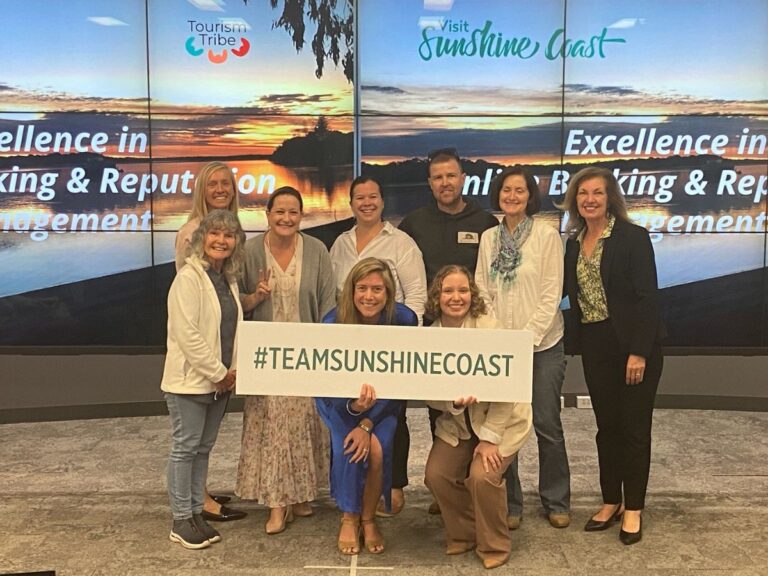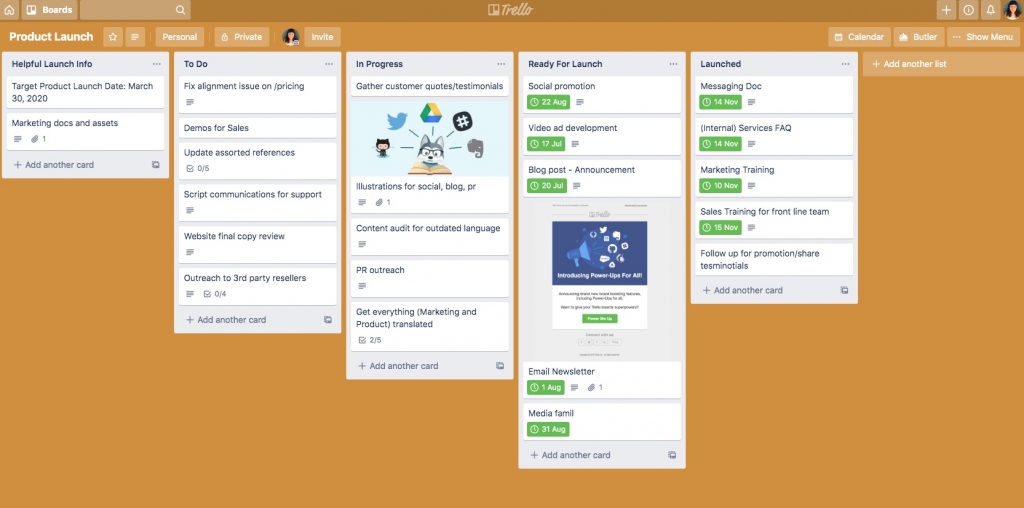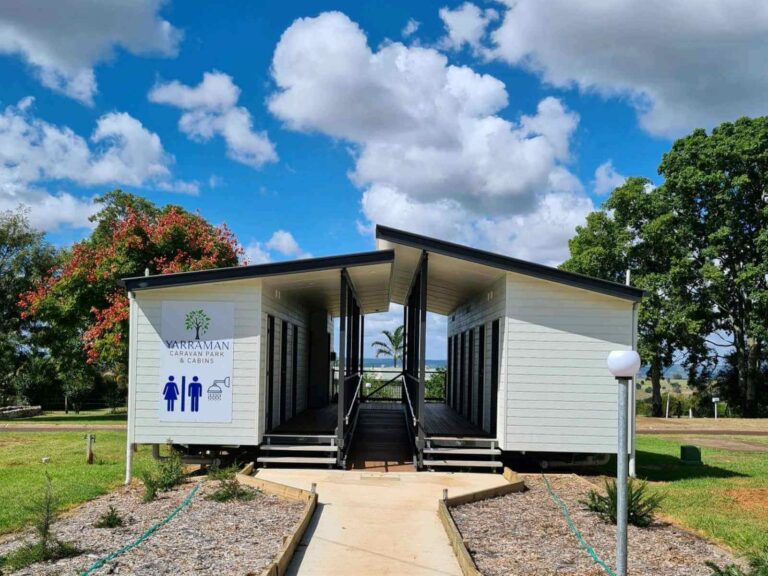
Visit Sunshine Coast SHINE Digital Transformation Program – Tourism Tribe Training
Shining a spotlight on tourism businesses committed to digital upskilling in an increasingly digitised world through our successful Tourism Tribe Training Program

The strange limbo period between Christmas and New Year’s Eve provides time to reflect on the year that was. To remember the highlights and lowlights, lessons learned and progress made. It’s also the time when one will inevitably start to anticipate what the new year might bring and to think about personal and professional aspirations.
For me, in the last few months of the year, I experience an increase in anxiety about how quickly the year has gone and how little time is left to achieve those goals that I had set back in January. As September becomes October becomes November becomes December, I find myself saying, “Where has this year gone!?”.
I know I’m not alone in this experience. So before we say goodbye to 2019, I wanted to reflect on and share some of the best advice regarding professional new year’s resolutions and how to keep them. So get out your notebook, let’s put pen to paper and set some intentions for 2020!
Before you start looking to the future, it’s helpful to think about the year just past. Reflection can put things into perspective, provide a sense of satisfaction and motivation. For this exercise, I want you to consider everything from business performance and profits, customer satisfaction, staff satisfaction and work-life balance, then make two lists under the headings below.
What goals did you set at the start of 2019 that weren’t met? What challenges did you struggle with most? Maybe you got some bad reviews or complaints relating to a specific service issue, or maybe you’ve realised that you didn’t put as much time into your social media presence as you probably should have.
It’s important to applaud yourself for your achievements. What goals did you meet? What products sold particularly well? Try to recall the best feedback you received from your customers. What about the positive feedback from your team? Taking this time to reflect on your successes will help motivate you to perform just as well if not better in the new year.

For some, coming up with new year’s resolutions is easy, you could write a list a mile long if given the chance. But for others the process might be more difficult, so here are some techniques that can help to get you started.
You know your business best, and sometimes if you just simply pen to paper and let the ink flow, you will be surprised what comes pouring out of your brain. At this stage, no ideas are bad ideas, you don’t have to commit just because you wrote it down, so let the ideas come.
Look back on what you wrote under the ‘could have done better’ heading earlier and figure out which of these points can be turned into goals for the new year. Think about the things that often go into the too hard basket that you can transfer into the to-do basket.
I know that we’re only planning our 2020 goals right now, but if you know that in 5 years you want to be in a different place to where you are now, it’s likely that you need to start making steps towards that goal ASAP in order to be able to achieve it by 2025. Break down your big goals and figure out what the first steps are and how you might achieve them in 2020.
Have you ever looked at what another business is doing and thought “I wish we could do that”. Well, the chances are that with enough planning and effort, you can! Think about what great examples of business management, product development or marketing that you have seen this year and how might achieve your own unique version of that.
If you are still unsure of what you should be prioritising in 2020, you can always request a digital health check of your business’ online presence. A digital health check is a systematic assessment of your business’ website, Google listing, TripAdvisor, Facebook and Instagram presence which provides you with recommendations on how you can improve your ability to attract and convert your target market on each of these platforms.
It’s time to get SMART! SMART goals are something often brought up in business, professional and personal development discussions. It is a way of thinking about goals that gives the goal-setter the best chance of achieving their aspirations. The SMART acronym stands for Specific, Measurable, Achievable, Relevant and Timely. By thinking about goals according to these five criteria, one can better understand exactly what it is they are trying to achieve.
For a goal to be SMART, it must be:
Specific: Goals should be clearly defined, not vague or ambiguous.
Measurable: You will be able to recognise when the goal has been achieved by understanding what the criteria for success is.
Achievable: Goals should be realistic, within reach and not beyond your means.
Relevant: Is the goal relevant to you and your business? Goals should be in alignment with your other priorities, ethics and purpose.
Timely: Goals should be time-bound by a deadline for completion.
For example, if your draft goal was to ‘Be more active on social media’, you need to think about how you can turn this into a SMART goal.
Is it specific?
In this example, the words more and social media are too vague. So let’s say you want to post 4 times per week on social media (that’s our recommendation). You also want to be specific about which social media channels you want to prioritise. For most tourism businesses, Facebook and Instagram are where you are most likely to achieve good engagement with your customers.
Is it measurable?
This goal is easy to measure by reviewing your previous posts using Facebook and Instagram analytics or simply looking back over your Facebook page and Instagram account and counting the posts you have created.
Is it achievable?
It might seem like a lot, but for most businesses four posts per week is achievable. If you think that it’s too much for you, then scale it back to 2 or 3 per week until you feel ready to ramp it up. You don’t want to get burnt out because you aimed too high.
Is it relevant?
Achieving a strong social media presence is a standard expectation in modern tourism business management. Your customers are on social media and so you should be too.
Is it timely?
Think about when you want to achieve this by. Habits don’t form overnight, so give yourself some time to set up new processes to help you become consistent.
Now that you know what you want to achieve, you need to determine how you will achieve it. Take each goal and break it down into as many smaller steps as you can. In your notebook, spreadsheet or word doc, number each of these steps in the order they need to be achieved, leaving space to write under each number. Then write out how much time will need to be dedicated to achieving each step, who will need to be involved and what kind of resources it will consume. Set deadlines for each step to help you stick to the plan.
Consider using an online project planning tool such as Trello to help you plan your goals. All the main functions of Trello are available to use for free and it can be a great way to visualise short and long-term projects in a way that is easy to update and customise. It’s also very handy for delegating tasks to your team members and setting deadlines for tasks. Other online project management tools such as OpenProject (free or paid) Monday.com (paid only) and ClickUp (free or paid) might also be worth considering. At the very least, your Google Calendar and Google Sheets are easy to use and free resources available at your fingertips.

Good luck and happy new year!


Shining a spotlight on tourism businesses committed to digital upskilling in an increasingly digitised world through our successful Tourism Tribe Training Program

Discover the path to small business success through Tania’s inspiring journey at Yarraman Caravan Parks & Cabins and gain valuable insights from her expert advice.

In today’s digital world, the power of online accessibility is one of the most understated search engine optimisation (SEO) strategies, and here you will find